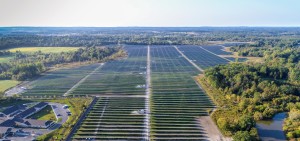By David Fleet
Editor
Atlas Twp.-Solar farms could be on the horizon for the township.
At 7 p.m., March 21, the township planning commission is expected to discuss zoning ordinances for solar farms.
“We’ve been approached, as have many communities, for solar farms,” said Rick Misek, planning commission chairperson. “As long as there are federal and state grants to build the solar farms we’re going to get companies interested.”
Misek said the planning commission will approach the solar farms ordinances like the cell tower instillation in the township.
“We don’t want the solar farms spreading out over 40 acres and all over the township,” he said. “The commission will listen to the people of the township, and like cell towers, attempt to keep the solar farms out of the public viewshead. Furthermore, if there is revenue to be had it should serve all the people of the township.”
Misek also addressed the long term impact of solar farms in the township.
“It’s not just a matter of hooking up to the (power) grid and then walking away for 20 years,” he said. “I may be enlightened someday, but how do you dispose of batteries or other materials associated with the solar farms when their usefulness is gone? I may be the pessimist that kept them from inventing the horseless carriage, but I don’t want taxpayers footing the bill for the solar farms when they fail.”
Cloudy Michigan days are a concern added Misek.
“Maybe this would work in Arizona, Utah, South Texas or Southern California were there’s ample sunshine,” he said. “But we seem to have plenty of gloomy days.”
The interest in alternative energy expressed to Misek along with other township officials could stem from government incentives.
In 2008, the Michigan legislature passed and Governor Jennifer Granholm signed Public Act 295 that required utilities in the state to generate 10 percent of their electricity from renewable energy resources by 2015. Then at the end of 2016 new legislation was enacted that raised the bar to 15 percent by 2021.
DTE Energy along with other utilities are moving forward with renewable energy programs.
“The Lapeer Solar Park went fully operational in December 2017 producing power to 11,000 homes” said Cindy Hecht, of DTE Energy. “The 200,000-panel array is located on about 250 acres and is one of the largest utility-owned solar parks east of the Mississippi River.”
DTE broke ground on the project in the spring of 2016.
“The solar power is on par with natural gas with cost,” she said. “Right now DTE operates 13 wind parks and 31 solar arrays in its renewable energy portfolio. Some are for private companies such as General Motors.”
Ed Henderson, is the DTE renewable energy operations manager.
“Right now DTE is not eyeing any new solar farms,” said Henderson. “The wind turbines are far more cost effective than solar, however, we look for that to change within the next 10 years as technology imporves. But solar (power) continues to gain ground each year.”
DTE manages their solar array with the environment in mind.
“There are no batteries in the process,” he said. “We don’t inventory power—rather move it right to the grid. The power is available when the sun is shining or the wind is blowing if it’s turbine is running. When it’s not it stops.”
The solar panels should last about 20 years.
“They will degrade over the years, but will continue to produce power,” he said. “We have a plan to remove and replace. We also seek locations that’s on unusable parcels, such as along highways.”
